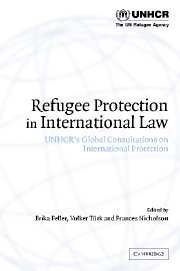Book contents
- Frontmatter
- Contents
- List of annexes
- Notes on contributors and editors
- Foreword
- Preface
- Acknowledgments
- Expert roundtables and topics under the ‘second track’ of the Global Consultations
- Table of cases
- Table of treaties and other international instruments
- List of abbreviations
- Part 1 Introduction
- Part 2 Non-refoulement (Article 33 of the 1951 Convention)
- Part 3 Illegal entry (Article 31)
- Part 4 Membership of a particular social group (Article 1A(2))
- Part 5 Gender-related persecution (Article 1A(2))
- Part 6 Internal protection/relocation/flight alternative
- Part 7 Exclusion (Article 1F)
- Part 8 Cessation (Article 1C)
- Part 9 Family unity (Final Act, 1951 UN Conference)
- Part 10 Supervisory responsibility (Article 35)
- 10.1 Supervising the 1951 Convention Relating to the Status of Refugees: Article 35 and beyond
- 10.2 Summary Conclusions: supervisory responsibility, expert roundtable, Cambridge, July 2001
- 10.3 List of participants
- Index
10.1 - Supervising the 1951 Convention Relating to the Status of Refugees: Article 35 and beyond
Published online by Cambridge University Press: 28 August 2009
- Frontmatter
- Contents
- List of annexes
- Notes on contributors and editors
- Foreword
- Preface
- Acknowledgments
- Expert roundtables and topics under the ‘second track’ of the Global Consultations
- Table of cases
- Table of treaties and other international instruments
- List of abbreviations
- Part 1 Introduction
- Part 2 Non-refoulement (Article 33 of the 1951 Convention)
- Part 3 Illegal entry (Article 31)
- Part 4 Membership of a particular social group (Article 1A(2))
- Part 5 Gender-related persecution (Article 1A(2))
- Part 6 Internal protection/relocation/flight alternative
- Part 7 Exclusion (Article 1F)
- Part 8 Cessation (Article 1C)
- Part 9 Family unity (Final Act, 1951 UN Conference)
- Part 10 Supervisory responsibility (Article 35)
- 10.1 Supervising the 1951 Convention Relating to the Status of Refugees: Article 35 and beyond
- 10.2 Summary Conclusions: supervisory responsibility, expert roundtable, Cambridge, July 2001
- 10.3 List of participants
- Index
Summary
Introduction
The expert roundtable process of the Global Consultations on International Protection initiated by the Office of the United Nations High Commissioner for Refugees (UNHCR) is intended to examine selected contemporary issues of international refugee law in detail and provide guidance to UNHCR, States, and other actors. Within this framework, the present study examines UNHCR's supervisory role under its Statute in conjunction with Article 35 of the 1951 Convention Relating to the Status of Refugees and Article II of the 1967 Protocol Relating to the Status of Refugees. It also looks at ways to make the implementation of these treaties more effective by creating new monitoring mechanisms going beyond the present supervisory regime.
Issues of supervision and implementation of the 1951 Convention have become relevant today not because States would challenge UNHCR's task of providing international protection as such, but because the implementation of the 1951 Convention and the 1967 Protocol is faced with many problems, including a lack of uniformity in the actual application of its provisions. This is true not only for many of the guarantees related to the status of refugees but also for such key provisions as Article 33 of the 1951 Convention on non-refoulement or the refugee definition as provided for by Article 1A of the 1951 Convention. UNHCR has repeatedly deplored a trend towards a more restrictive interpretation of the 1951 Convention and its 1967 Protocol in certain countries or even regions of the world.
- Type
- Chapter
- Information
- Refugee Protection in International LawUNHCR's Global Consultations on International Protection, pp. 613 - 666Publisher: Cambridge University PressPrint publication year: 2003
- 8
- Cited by

